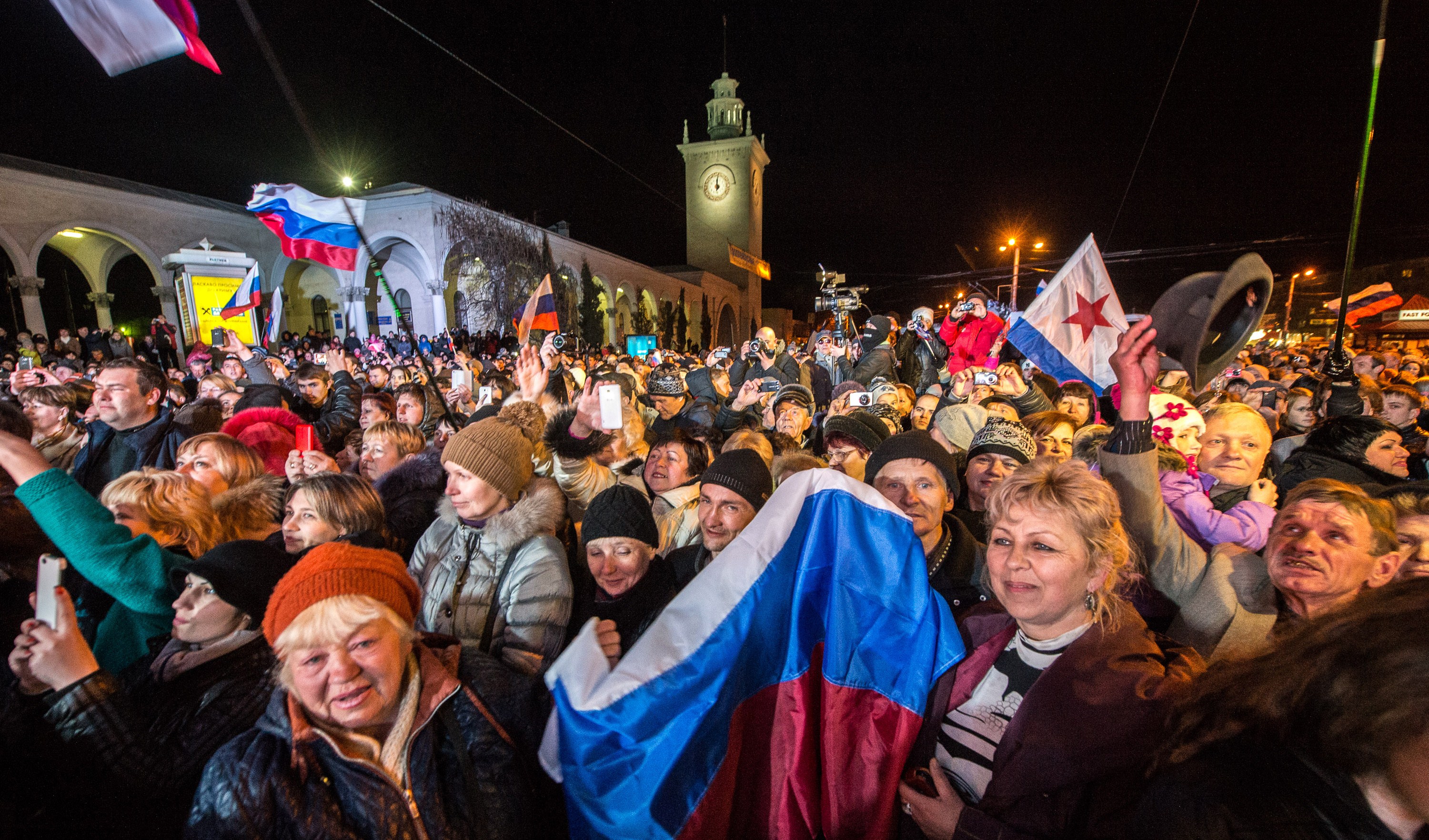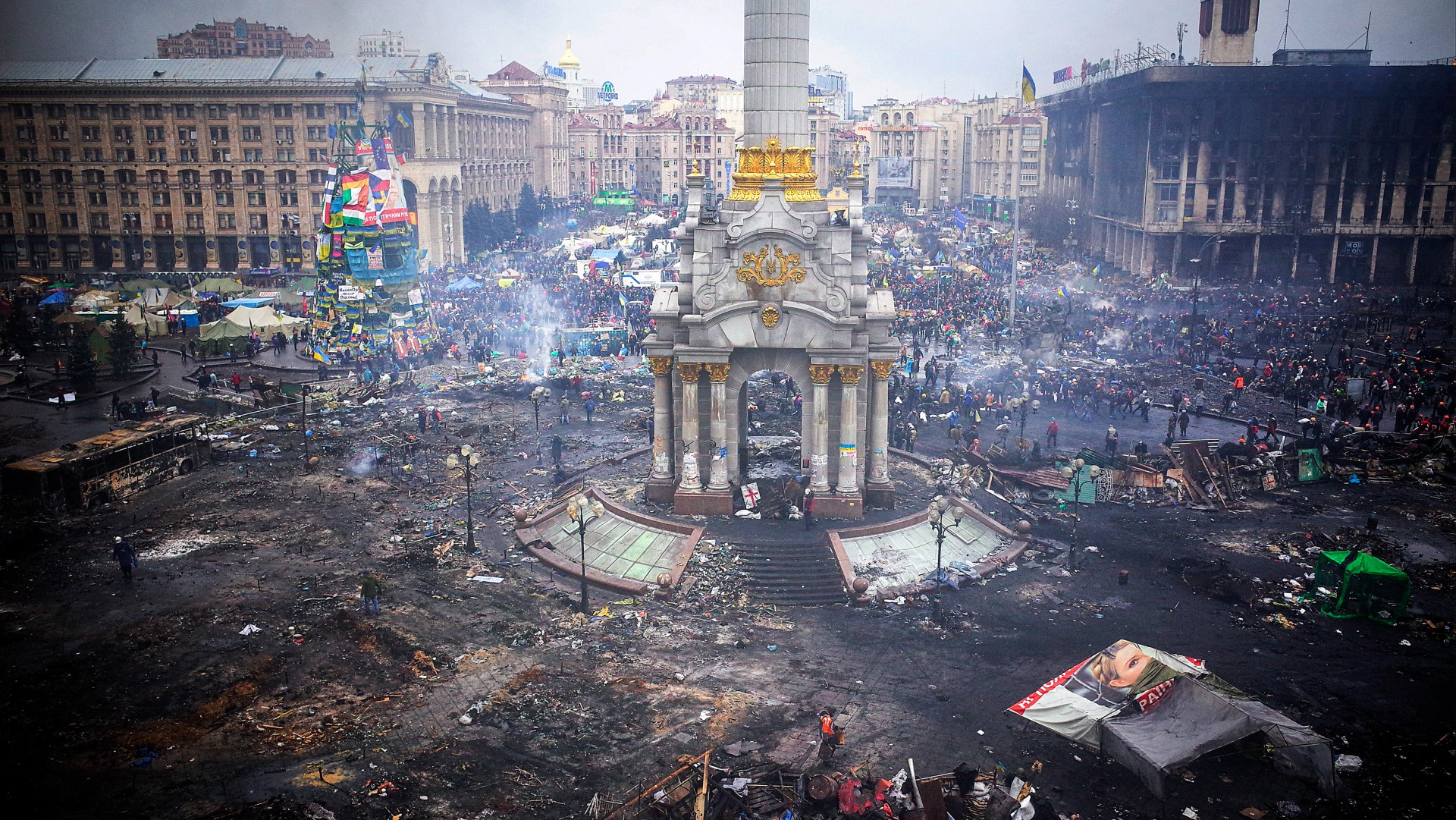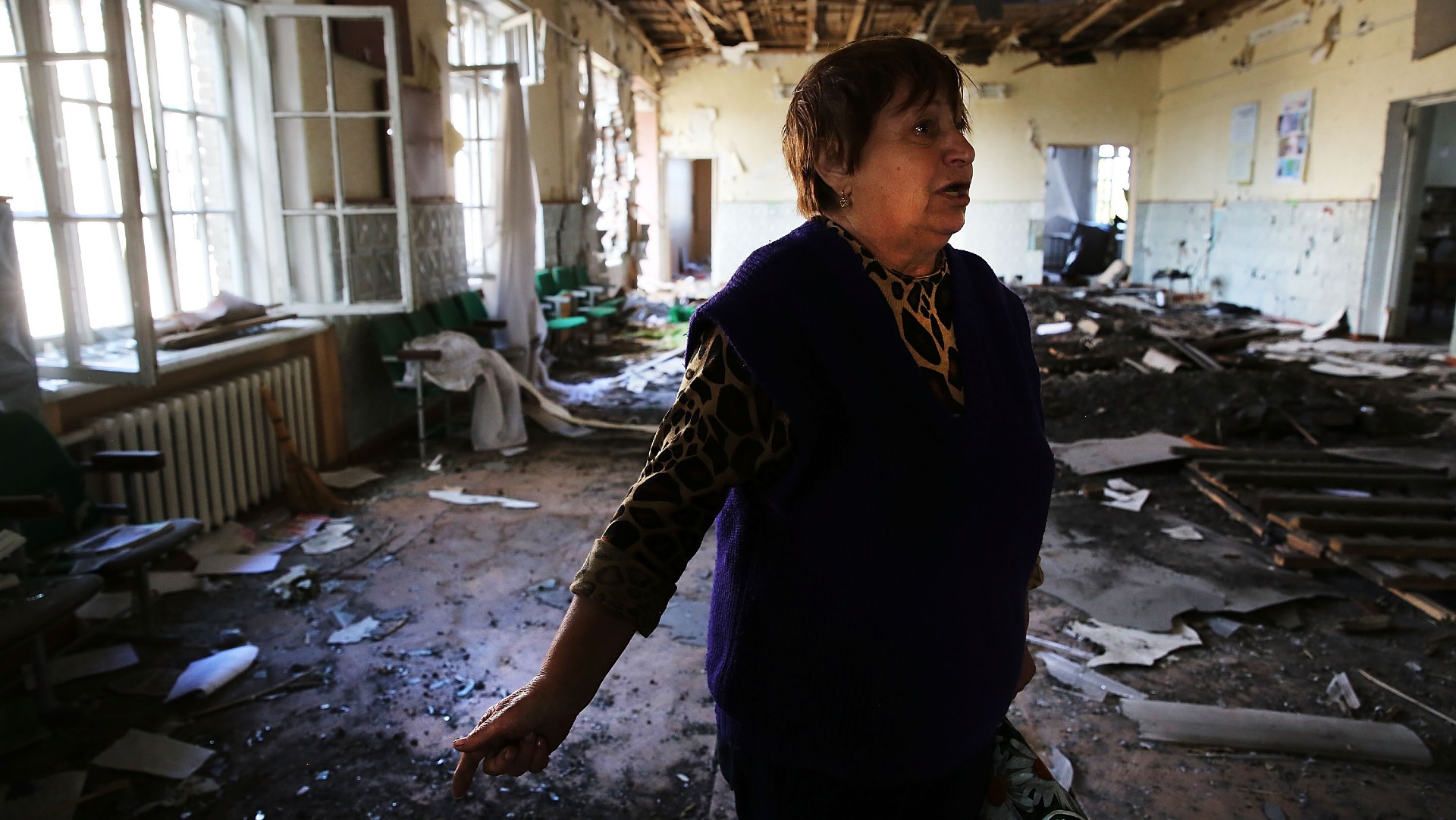A timeline of Crimea’s annexation
How Vladimir Putin came to invade and control the Black Sea territory eight years ago

A free daily email with the biggest news stories of the day – and the best features from TheWeek.com
You are now subscribed
Your newsletter sign-up was successful
Tomorrow marks eight years since Russia illegally annexed the Crimean Peninsula from Ukraine, marking the biggest land-grab in Europe since the Second World War.
As the latest battle between Kyiv and the Kremlin rages on, here is a look back at how Vladimir Putin came to invade and take control of the disputed Black Sea territory.
November 2013: Euromaidan protests
In November 2013, tens of thousands of Ukrainians took to the streets of the capital Kyiv after the pro-Moscow president Viktor Yanukovych refused to sign a planned association deal with the EU, putting the brakes on Ukraine’s pro-European trajectory.
The Week
Escape your echo chamber. Get the facts behind the news, plus analysis from multiple perspectives.

Sign up for The Week's Free Newsletters
From our morning news briefing to a weekly Good News Newsletter, get the best of The Week delivered directly to your inbox.
From our morning news briefing to a weekly Good News Newsletter, get the best of The Week delivered directly to your inbox.
The Euromaidan protests, also known as the Revolution of Dignity, were named after Maidan Nezalezhnosti, or Independence Square, in Kyiv, where the demonstrations mainly took place. Kyiv’s city hall was occupied in the largest protests since the country’s Orange Revolution in 2004.
The wave of demonstrations continued, encompassing other cities and wider causes, including outcry against perceived government corruption and lack of accountability.
18 to 20 February 2014: fatal crackdown
The continued protests were met with a brutal crackdown by the government, with an estimated 108 civilians killed, many by police snipers, peaking on 18 to 20 February. This led to the ousting of Yanukovych, who spent a week on the run before heading to Russia. Putin described the protests as a Western-backed “fascist coup” that endangered the ethnic Russians, particularly in Crimea.

26 to 28 February 2014: Russian flag raised
On 26 February, Russia put 150,000 troops on high alert. The following day, armed men seized the parliament of the predominantly ethnic Russian Crimean Peninsula and raised the Russian flag. A day after that they took control of two airports in the region.
A free daily email with the biggest news stories of the day – and the best features from TheWeek.com
1 March 2014: parliamentary approval to invade
On 1 March, Putin won parliamentary approval to invade Ukraine, responding to what he called a threat to Russian lives. “We consider the behaviour of the Russian Federation to be direct aggression against the sovereignty of Ukraine,” said Ukraine’s interim president at the time, Oleksandr Turchynov.
John Kerry, then US secretary of state, condemned Russia’s “incredible act of aggression”. He “threatened economic sanctions by the United States and allies to isolate Moscow” but also “called for a peaceful resolution to the crisis”, reported Reuters at the time.
Within weeks, Putin had annexed the region – a move justified as a rescue operation. He also encouraged Russian separatists in the eastern regions of Donetsk and Luhansk to fight Ukraine’s armed forces. It is estimated that more than 14,000 people have died in the civil war since.

16 March 2014: disputed referendum
On 16 March, a disputed referendum found that an overwhelming number of voters in Crimea supported joining Russia – leading Putin to say that he would respect the people’s wishes.
Crimea’s chief electoral official, Mikhail Malyshev, said the vote was nearly 97% in favour of joining the Russian Federation, with a turnout of 83%, reported the BBC. But Western leaders said the referendum was held in an atmosphere of intimidation after Russia had already violated Ukraine’s territorial sovereignty.
The vote was boycotted by many Crimeans loyal to Kyiv, and condemned as illegal by the EU and US. “We reject the ‘referendum’ that took place today in the Crimean region of Ukraine,” said Jay Carney, the White House press secretary at the time.
17 March 2014: declaration of independence
A day later, Crimea’s parliament formally declared independence from Ukraine and asked to join the Russian Federation.
18 March 2014: treaty of accession
The following day, Putin signed a treaty of accession with Crimean leaders and declared that Russia was within its rights to reclaim Crimea.
“In a speech to a joint session of the Russian parliament, he compared the move to the independence declaration of Kosovo in 2008 and the reunification of Germany in 1990 – but, in reality, this is the first time that one European nation has seized territory from another since the end of World War II,” reported The Washington Post at the time.
Ukraine’s foreign ministry said it did not “and never will recognise the so-called independence or the so-called agreement on Crimea joining the Russian Federation”.
24 March 2014: rouble goes into circulation
Following the annexation, Russia forced all Ukrainian banks in the region to close, leaving thousands of people without access to their savings, salaries and pensions.
On 24 March, the rouble was officially introduced and on 27 May it became the peninsula’s only legal currency. A year and a half later, the rouble was worth about half of what it was before the annexation.
30 March 2014: new time zone
On the evening of 30 March, the peninsula skipped forward two hours to formally join Moscow’s time zone. Several hundred people gathered at the main railway station in Simferopol for the ceremonial change of time, “waving Russian national flags and chanting ‘Crimea! Russia!’”, reported Reuters.
More than anything, the clock change was “a symbol of the bigger shifts in the Crimean peninsula over the past few months”, said The Washington Post. By that time, Moscow was “already controlling Crimea’s currency and paying government salaries in Crimea” – now it controlled the time, too.
11 April 2014: Kremlin-backed constitution
On 11 April, Crimean lawmakers voted to adopt a new, Kremlin-backed constitution.
“All 88 deputies present in the 100-seat legislature broke into applause and stood for the Russian national anthem after approving the constitution in the vote at a session ignored by dissenting lawmakers,” said Reuters at the time.
The legislation stipulated that Crimea would “be fully integrated into Russia” by 1 January, following a short transition period.
5 September 2014 and 12 February 2015: Minsk agreements
France and Germany brokered the Minsk agreements in September 2014 and February 2015, signed by the leaders of Ukraine, Russia, France and Germany as a response to the annexation and fighting in Luhansk and Donetsk.
The agreements attempted to impose a ceasefire, the withdrawal of heavy weapons, Ukrainian control over its border with Russia, and special political status for parts of the two eastern regions. Amnesty was also given to the pro-Russia separatists involved in the fighting.
Seven years later, on 22 February 2022, Putin told reporters that the Minsk agreement “no longer” existed following his recognition of the independence of Luhansk and Donetsk.
-
 Bad Bunny’s Super Bowl: A win for unity
Bad Bunny’s Super Bowl: A win for unityFeature The global superstar's halftime show was a celebration for everyone to enjoy
-
 Book reviews: ‘Bonfire of the Murdochs’ and ‘The Typewriter and the Guillotine’
Book reviews: ‘Bonfire of the Murdochs’ and ‘The Typewriter and the Guillotine’Feature New insights into the Murdoch family’s turmoil and a renowned journalist’s time in pre-World War II Paris
-
 Witkoff and Kushner tackle Ukraine, Iran in Geneva
Witkoff and Kushner tackle Ukraine, Iran in GenevaSpeed Read Steve Witkoff and Jared Kushner held negotiations aimed at securing a nuclear deal with Iran and an end to Russia’s war in Ukraine
-
 Putin’s shadow war
Putin’s shadow warFeature The Kremlin is waging a campaign of sabotage and subversion against Ukraine’s allies in the West
-
 Alexei Navalny and Russia’s history of poisonings
Alexei Navalny and Russia’s history of poisoningsThe Explainer ‘Precise’ and ‘deniable’, the Kremlin’s use of poison to silence critics has become a ’geopolitical signature flourish’
-
 What happens now that the US-Russia nuclear treaty is expiring?
What happens now that the US-Russia nuclear treaty is expiring?TODAY’S BIG QUESTION Weapons experts worry that the end of the New START treaty marks the beginning of a 21st-century atomic arms race
-
 Epstein files topple law CEO, roil UK government
Epstein files topple law CEO, roil UK governmentSpeed Read Peter Mandelson, Britain’s former ambassador to the US, is caught up in the scandal
-
 Iran and US prepare to meet after skirmishes
Iran and US prepare to meet after skirmishesSpeed Read The incident comes amid heightened tensions in the Middle East
-
 Israel retrieves final hostage’s body from Gaza
Israel retrieves final hostage’s body from GazaSpeed Read The 24-year-old police officer was killed during the initial Hamas attack
-
 China’s Xi targets top general in growing purge
China’s Xi targets top general in growing purgeSpeed Read Zhang Youxia is being investigated over ‘grave violations’ of the law
-
 Ukraine, US and Russia: do rare trilateral talks mean peace is possible?
Ukraine, US and Russia: do rare trilateral talks mean peace is possible?Rush to meet signals potential agreement but scepticism of Russian motives remain